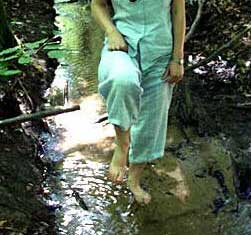    |
                   
                     By Lorenz Kerscher
By Lorenz Kerscher
Make use of the sense of touch of the soles, for it is almost as highly developed as that of the hands! With animals and plants you may share the sensation of warmth and chill, the roughness of a dried-out ground or the freshness of reviving moisture.

On bare feet you relax and improve your body awareness. Training of body awareness is central to every relaxation technique. This compensates for the common dominance of the brain, which is due to civilization. Going barefoot in natural environment is simple and easily done, and therefore will not be ranked among the relaxation doctrines. But it equals their benefits! What you feel with the feet is close to nature but far away from the brain. This is the counterbalance required for getting in touch with the middle of the body and helps to overcome internal strains and to diminish stress.
| Going Barefoot Protects the Environment |

- It preserves vegetation and ground, does not make noise -- and without shoes we develop a vigorous environmental instinct:
- The eyes of a barefoot person keep good contact with the ground, therefore their feet do not crush plants and animals.
- A natural reluctance against mud and thorns or the sharp edges of reed grasses teaches barefooters to respect sensitive biotopes.
- Barefoot hikers want to see what they step on; therefore they avoid cross-country marches, which might damage the environment. They prefer to stick to low grass and pleasant ways through fields, forests and meadows.
- On gravel or in swampy areas barefooters tend to move very carefully, therefore they are no danger for hidden animals like birds breeding on the ground.
- Worn-out shoes are a waste product that cannot be recycled. So it is much better to avoid their use whenever possible!
- For barefoot walking over longer distances, natural ground (i.e. lawn, earth or sand) feels much more pleasant than asphalt and concrete. When shoe soles were invented as barriers between mankind and nature, there was no more obstacle to building up desert-like towns from aggressive and dead materials. Those who like to go barefoot, should stand up for the unsealing of the earth, at least around their homes, schools, playgrounds etc..
| The essence is: give liberty back to your feet! |

The feet can perceive liberty very intensely. No doubt, in special situations the feet are to be protected, but this should not result in lifelong constraint! Being barefoot may well be part of an active lifestyle open to new experiences. You invest some courage in this liberty and regain a lot of well-being and self-confidence.

- You need not become a fakir. Keep your feet away from stubble-fields, sharp-edged reed grasses and stones as well as from extremes of temperature! With gradual conditioning, however, the feet can learn to adapt to various surface and weather conditions. Nevertheless, beware of insane ambition!
- Usually the ground is warmer than expected, for it collects solar warmth better than the air. Even on sunny March days it feels pleasantly warm! On the other hand, the ground can be quite frosty in the early morning hours after a clear night.
- To start off, short outings on pleasant ground are just the right activity. Within a few weeks, the soles become tougher, the motion more harmonious and the sensation becomes wonderful! Soon the soles will have developed sufficient stability to walk on field and forest paths, and even to resist flat pieces of broken glass.
- Thickened skin may become rough due to a lack of natural abrasion. Therefore lotion or lanolin should be applied regularly to prevent skin cracks.
- When the sun stands high, the feet may need some sun protectant!
- A well conditioned sole is unlikely to suffer injury, if you avoid stepping on thistles, reed grasses, thorny plants and flowers attracting bees (like clover). Broken glass does not exist in nature, but rather along streets and around sport facilities, barbecue places or bathing areas. Be more cautious if your soles are not yet hardened, if you are allergic to insect stings or if you have not had a tetanus vaccination!
- On running, stronger forces act on the soles -- therefore the ground should be free of sharp stones and splinters. Be cautious during jogging in unknown areas!
- Some strips of adhesive (Moleskin) should be in your pocket. Usually you will need them to treat the blisters of your shoed companions!
- If prescribed by safety instructions or in case of a substantial risk of injury, you better wear shoes. This is advisable for example when moving heavy loads, caring for horses, lawn-mowing, or in high mountain areas. But then shoes must be sturdy enough to assure the expected safety!
- Dirt is easily washed away, but it is difficult to reverse the damage due to unsuited footware!
- City barefooting makes the soles black. Depending on your attitude you may regard this as annoying, as unimportant or as a special style. Ideally, you can find playgrounds, parks and sport facilities where you can practise natural walking without exposing the skin to dirty streets.
|
    |

